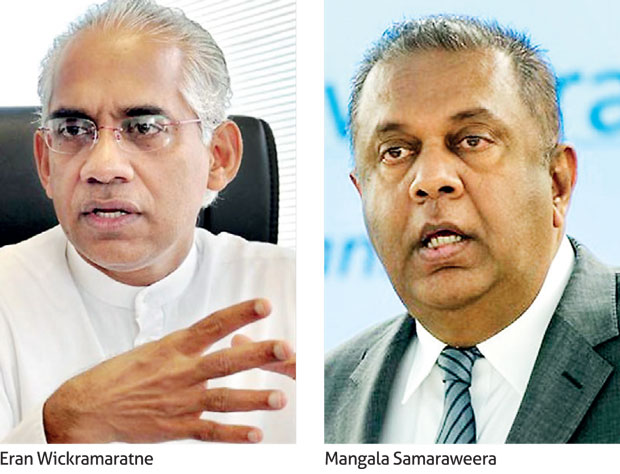22 Jul 2017 - {{hitsCtrl.values.hits}}
Focuses on reducing indirect tax burden on people
Aims to turn tax system into a simpler, more direct structure
World Bank and credit rating agencies laud new law
New law to be implemented from next financial year
By Chandeepa Wettasinghe
The new Inland Revenue Bill, which the government is pinning its hopes on to create a just and broad taxation system, will likely be passed by parliament this August, after incorporating amendments proposed by the Supreme Court and other stakeholders, Sri Lanka’s Finance and Media Minister said.
“We hope to present the legislation, with the suggestions from the Supreme Court and others, to parliament and get it passed in the third week of August,” Minister Mangala Samaraweera said yesterday.
The Bill was tabled in parliament earlier this month, and several Supreme Court cases have already been filed against it.
Samaraweera said that even in the committee stage of legislative procedure, if relevant stakeholders present useful and fair suggestions to the proposed legislation, they will be incorporated into the Bill.
Finance State Minister Eran Wickramaratne added that some concerns, such as those of exporters who fear falling into the full income tax bracket, are already under consideration, since the country cannot afford for its exports to decline at this juncture. Sri Lanka is currently in a balance of payment crisis.
Samaraweera and Wickramaratne, both extremely poised, were speaking at the first press conference held at the Finance Ministry following the recent cabinet reshuffle.
Samaraweera said that the new Inland Revenue Bill is the first of many pieces of legislation that will aim to turn the country’s tax system into a simpler, more direct tax system.
“My main immediate goal is to reduce indirect taxes to 60 percent and direct taxes to 40 percent. This (law) is just the first step. With this, we can provide a great relief to the low income earners,” he added, after saying that regional countries such as Malaysia, India and Bangladesh were ahead of Sri Lanka.
Currently, indirect taxes make up 80 percent of Sri Lanka’s tax collection, with low-income households paying as much in taxes as tuition masters, consulting doctors, architects, lawyers, other professionals and black money makers, who earn in millions, which is unjust, Samaraweera said. “They’re having a field day. I must say that many professionals are very unpatriotic, because they do everything possible to evade taxes,” he added.
The proposed law, drafted with the help of the International Monetary Fund, was lauded by the World Bank and credit rating agencies.
“Once we have successfully implemented the new law and broad based the tax net, we can look at reducing the indirect tax burden on the people,” Samaraweera added, after earlier saying that the legislation would help the government reach the 3.5 percent budget deficit target set for 2020.
Wickramaratne said that the new law will be implemented at the start of the new financial year next April, although the bureaucracy will have plenty of time to train and put relevant software in place to process taxes under the new system, since tax returns have to be filed 6 months after the end of the financial year in March 2018.
“There are several steps on the implementation. Whenever there’s a change, obviously there’s going to be some disruption. There’s an acceptable level of disruption. We don’t see that there will be a huge problem. Various steps have been drawn up. A timetable has been drawn up for implementation, and we are trying to make sure it happens in the smoothest possible way,” he said.
Wickramaratne noted that the new legislation will create predictability for the private sector, and there will be less chances for politicians or bureaucrats to provide exemptions or loopholes for some businesses.
Samaraweera added that after the bill was passed, some current practices, such as providing duty-free vehicle permits for public sector officials who engaged in private consultancies will be revisited, to ensure fairness.
Religious institutions that engage in commercial activities will also be taxed under the new law.
Samaraweera said that the Inland Revenue Bill is just one of the 3rd wave of economic reforms envisaged by the government.
“Everyone who loves this country should support it. The relevant officials have to support it, and I hope that we get their support,” he added.

07 Jan 2025 3 hours ago
07 Jan 2025 3 hours ago
07 Jan 2025 4 hours ago
07 Jan 2025 6 hours ago
07 Jan 2025 6 hours ago